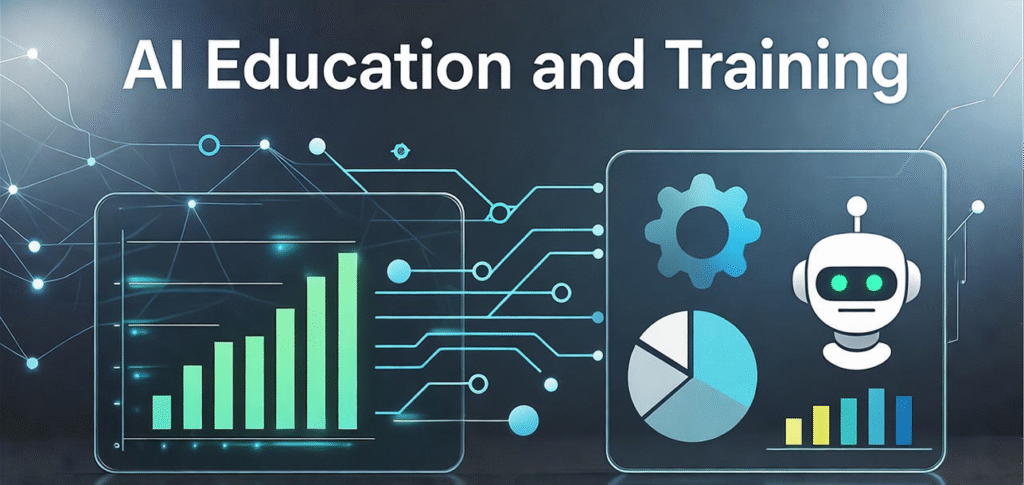Artificial Intelligence has become part of everyday work, shaping how decisions are made and tasks are handled across organizations. As these tools become more common, it is increasingly important for employees to understand how AI works and what it can do. Learning to use AI is no longer optional. It is a skill every organization needs to stay ahead.
But who really needs to have AI education and training? The answer is simple: every employee, especially those who lead teams, shape business strategy, or make important decisions. Understanding AI is quickly becoming a key skill for staying competitive, improving efficiency, and spotting new opportunities. Let’s explore why AI is now essential for every organization.

Why AI Education and Training Are Becoming Essential
AI is already part of our daily routines from the tools that suggest what we buy online to the systems businesses use to analyze data and improve performance. It’s making tasks easier and decisions smarter, but to use it effectively, people need to understand how it works. That’s where learning comes in.
Across the world, companies are adopting AI to stay competitive, and jobs are shifting to meet new demands. Businesses now want employees who can work confidently with AI — not just to automate processes, but to innovate and solve real problems.
AI education isn’t only about gaining technical skills; it’s about understanding how technology affects work, society, and the future. Those who take the time to learn will be better prepared to adapt, make informed decisions, and lead in a world that’s changing faster than ever.
Who Needs AI Education and Training?
AI learning isn’t limited to one group—it’s for anyone looking to keep up. Here’s who can benefit and why it’s becoming a necessity:
1. Business Owners and Managers
If you’re running a team or company, knowing AI helps you make smarter moves. It can optimize workflows, like managing stock better or tailoring ads for customers. Leaders who understand AI can find ways to save costs and stay ahead of rivals.
Why they need it: To make solid decisions and lead their businesses through a tech-focused market.
2. Tech Workers and Programmers
For those in tech, like developers or IT staff, AI skills open new doors. Mastering tools like data analysis or machine learning can lead to jobs such as AI specialist or data analyst, which are increasingly sought after.
Why they need it: To remain valuable in a field where AI expertise is a growing requirement.
3. Teachers and Students
Today’s classrooms are shaping tomorrow’s workers. Students, whether in high school or college, can gain an advantage by learning how AI influences industries and careers. Teachers need training to weave AI into their lessons, preparing students for what’s ahead.
Why they need it: To get ready for future roles and think deeply about technology’s role.
4. Creative Professionals
Writers, designers, and marketers are using AI to enhance their work. Tools can generate content or create visuals, saving time and sparking ideas. Understanding these tools can set them apart in their fields.
Why they need it: To work more efficiently, improve output, and compete effectively.
5. Entrepreneurs and Small Business Owners
AI isn’t just for big firms. Small businesses can use it to automate support or study customer trends. Entrepreneurs who learn AI can grow their operations and challenge larger competitors without heavy costs.
Why they need it: To level the playing field and run their businesses more effectively.
6. Policymakers and Regulators
As AI spreads, concerns about privacy, fairness, and ethics are rising. Those making laws need to know how AI operates to create rules that protect people while encouraging progress. This means understanding both the tech and its wider impact.
Why they need it: To develop policies that support innovation and public safety.
7. Professionals in Any Field
From HR teams using AI to review resumes to healthcare workers relying on diagnostic tools, AI is showing up everywhere. Basic knowledge helps them use it confidently, recognize its limits, and promote fair practices at work.
Why they need it: To adjust to workplace shifts and handle AI tools with ease.
Ways to Learn About AI
There are options for everyone, no matter where you’re starting:
- Online Classes and Certifications: Platforms like Coursera, edX, or Udemy offer courses from beginner to advanced, covering topics like data analysis or AI ethics.
- Workshops and Short Programs: Hands-on sessions help professionals build skills fast.
- College Degrees: Universities provide programs in AI and related areas for those wanting deeper knowledge.
- Free Resources: Blogs, videos, and tutorials online make it simple to start on your own.
- Workplace Training: Many companies offer sessions to help staff get familiar with AI tools.
How to Start Your AI Learning Journey
Ready to begin? Here’s a straightforward approach:
- Set Your Goals: Are you looking for basics, practical skills, or a detailed technical understanding? Your aim guides your path.
- Choose Good Resources: Start with easy courses if you’re new, or explore advanced topics if you’re tech-savvy.
- Try It Out: Experiment with tools like Google’s TensorFlow or simple platforms to see AI in action.
- Stay Updated: AI moves quickly, so follow blogs, join discussions, or watch talks to keep current.
- Think About Ethics: Learn about AI’s effects on privacy and fairness to use it responsibly.
Join the course: AI Business Masterclass Today – Recommended for organizations and individuals

What you’ll get in this Course
- Boost your productivity for business
- Save time and money by getting more done in less time
- The only course you’ll ever need to boost your productivity and business with AI
- 38 HQ video lessons + handouts, cheat-sheets and articles
- Full 30-day money-back guarantee
30-Day Money-Back Guarantee
What’s Next for AI Education
As AI continues to grow, education will be crucial to ensure everyone can take part. Schools, businesses, and governments should collaborate to make training available. This could mean adding AI to school programs, offering affordable courses, or promoting diversity in tech to address biases.
By learning AI, individuals and companies can unlock opportunities, tackle issues, and prepare for changes. Whether you’re a student, a professional, or a leader, now is the time to act.
Conclusion
AI education and training are becoming essential for anyone aiming to succeed today. From business owners to teachers, creatives to policymakers, understanding AI offers real advantages. Start your learning journey now and get ready to embrace what’s ahead.

